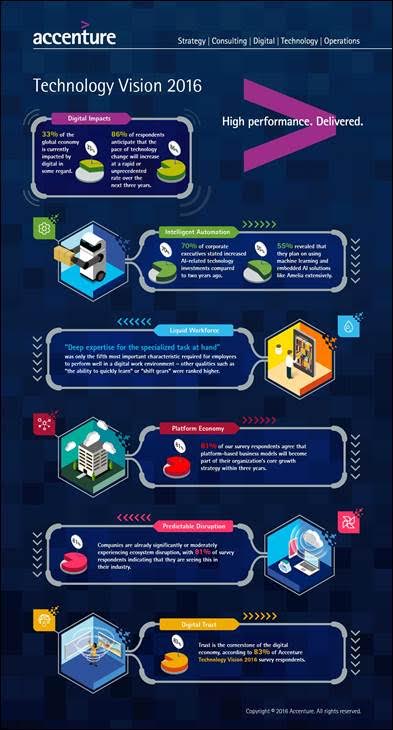Accenture has released a report titled Accenture Technology Vision report for 2016. The report investigates five trends behind a ‘people-first’ approach: Intelligent automation, liquid workforces, the platform economy, predictable disruption and digital trust.
Winners in the digital age do much more than complete a technology check-list, they focus on enabling people – consumers, employees and ecosystem partners – to do more with technology. That demands a digital corporate culture enabling people to continuously adapt, learn, create new solutions, drive relentless change, and disrupt the status quo. The end goal for every organisation to adapt itself in this digital age would be to integrate change into one’s organizational DNA and this could only be done through the most effective means possible- people.
The Accenture Technology Vision 2016 was conducted a global survey of more than 3,100 business and IT executives across 11 countries with India contributing to about 8 % of the sample size to understand their perspectives on the impact of technology on their organizations, and to identify their priority technology investments over the next few years.
In the report, Accenture identifies five technology trends fuelled by the people first principal that are essential to business success in the digital economy. The trends include:
Intelligent automation : Leaders are embracing automation – powered by artificial intelligence [AI], robotics and augmented reality – to fundamentally change the way their business operates and drive a new, more productive relationship between people and machines. Significant investments are well under way with 70 percent of survey respondents acknowledging increased AI-related technology investments compared to two years ago, and 55 percent revealing that they plan on using machine learning and embedded AI solutions like IPsoft Amelia extensively.
Liquid workforce : By exploiting technology to enable workforce transformation, leading companies will create highly adaptable and change-ready environments that are able to meet today’s dynamic digital demands. The competitive advantage offered by a liquid workforce is apparent as survey respondents indicated that “deep expertise for the specialized task at hand” was only the fifth-most-important characteristic they required for employees to perform well in a digital work environment. Other qualities such as ‘the ability to quickly learn’ or ‘the ability to shift gears’ were ranked higher.
Platform economy : Industry leaders are unleashing the power of technology by developing platform-based business models to capture new growth opportunities, driving the most profound change in the global macroeconomic environment since the Industrial Revolution. This is reinforced by 81 percent of our survey respondents who agree that platform-based business models will become part of their organization’s core growth strategy within three years.
Predictable disruption : Fast-emerging digital ecosystems are creating the foundation for the next wave of disruption by straddling markets and blurring industry boundaries; forward-thinking leaders can pro-actively predict these ecosystem trajectories to gain a competitive advantage. Companies are already significantly or moderately experiencing ecosystem disruption, with 81 percent of survey respondents indicating that they are seeing this in their industry.
Digital Trust : Trust is a cornerstone of the digital economy, said 83 percent of survey respondents. To gain the trust of individuals, ecosystems and regulators in this new landscape, businesses must focus on digital ethics as a core strategy; better security alone won’t be enough.
The complete report can be downloaded from here
For nearly 16 years, Accenture has taken a systematic look across the enterprise landscape to identify emerging technology trends that hold the greatest potential to disrupt businesses and industries. For more information on this year’s report, visit technology vision on Accenture or follow the conversation on Twitter with #TechVision2016.
About the Methodology
Accenture’s Technology Vision is developed annually by the Accenture Technology Labs. For the 2016 report, the research process included gathering input from the Technology Vision External Advisory Board, a group comprising more than two dozen experienced individuals from the public and private sectors, academia, venture capital firms and entrepreneurial companies. In addition, the Technology Vision team conducted interviews with technology luminaries and industry experts, as well as with nearly 100 Accenture business leaders.
In parallel, Accenture Research conducted a global survey of more than 3,100 business and IT executives across 11 countries and 12 industries to capture insights into the adoption of emerging technologies. The survey helped identify the key issues and priorities for technology adoption and investment. Respondents were mostly C-level executives and directors, with some functional and line-of-business leads, at companies with annual revenues of at least US$500 million, with the majority of companies having annual revenues greater than US$6 billion.


